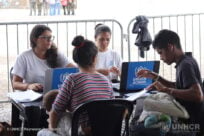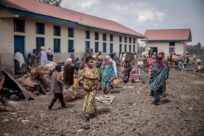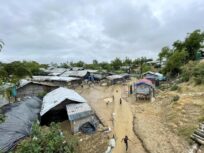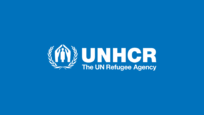UNHCR’s Guterres: Syria refugees reach one million
Data received from UNHCR’s offices in the Syria region shows that the number of Syrians either registered as refugees or being assisted as such has now reached the one million mark.
“With a million people in flight, millions more displaced internally, and thousands of people continuing to cross the border every day, Syria is spiraling towards full-scale disaster,” said UN High Commissioner for Refugees António Guterres. “We are doing everything we can to help, but the international humanitarian response capacity is dangerously stretched. This tragedy has to be stopped.”
The number of Syrian refugees fleeing their country has increased dramatically since the beginning of the year. Over 400,000 have become refugees since 1st January 2013. They arrive traumatized, without possessions and having lost members of their families. Around half of the refugees are children, the majority under the age of eleven. Most have fled to Lebanon, Jordan, Turkey, Iraq and Egypt. Increasingly, Syrians are also fleeing to North Africa and Europe.
“This number translates into one million people who are dependent on the generosity of host countries, the response of humanitarian agencies and the financial support of governments and individuals,” said Guterres.
Guterres noted that the impact of this large number of refugees arriving in neighbouring countries is severe. Lebanon’s population has increased by as much as 10 per cent. Jordan’s energy, water, health and education services are being strained to the limit. Turkey has spent over US$600 million setting up 17 refugee camps, with more under construction. Iraq, juggling its own crisis with more than one million Iraqis internally displaced, has received over one hundred thousand Syrian refugees in the past year.
“These countries should not only be recognized for their unstinting commitment to keeping their borders open for Syrian refugees, they should be massively supported as well,” said Guterres.
In December, the UN’s Regional Response Plan for Syrian Refugees estimated that 1.1 million Syrian refugees would arrive in neighbouring countries by the end of June 2013. UNHCR is in the process adjusting this plan accordingly in light of the new figures. Currently, the plan is only approximately 25 per cent funded.
Absent a political solution to the conflict, Guterres said, “at a minimum, humanitarian actors should receive the funds needed to save lives and ease suffering.”
The Syria crisis will be two years old next week. High Commissioner Guterres will be travelling to the region later this week to visit UNHCR operations in Turkey, Jordan, and Lebanon.
Page 11 of 22
-

Congolese family sets sights on a fresh start in Norway
08.12.2021The Kamaris* are looking towards a new life, thanks to resettlement – one of the durable solutions that affords refugees a chance to rebuild, after the trauma of conflict.
-

UNHCR and Ericsson sign global partnership agreement
08.12.2021The partnership will ensure faster and more efficient connectivity to people, who have been forced to flee their homes – and already, equipment is on its way to help displaced Venezuelans in Colombia.
-

UNHCR urges support to address worsening gender-based violence impact on displaced women and girls
25.11.2021One in five refugee or internally displaced women have faced sexual violence. Today, given the prolonged human rights and socio-economic impact of the COVID-19 pandemic, we know this situation has only worsened. From Afghanistan, Colombia, to the Democratic Republic of the Congo, and beyond, the deleterious impact of conflict, COVID-19 and displacement has been felt acutely by women […]
-

UNHCR: Conflict, violence, climate change drove displacement higher in first half of 2021
11.11.2021The trend in rising forced displacement continued into 2021 – with global numbers now exceeding 84 million – as more people fled violence, insecurity and the effects of climate change, according to the Mid-Year Trends report released today by UNHCR, the UN Refugee Agency. The report, for January-June 2021, showed an increase from 82.4 […]
-

UNHCR and IOM Call for immediate de-escalation at the Belarus-Poland border
10.11.2021UNHCR, the UN Refugee Agency, and the International Organization for Migration (IOM) are alarmed by the latest reports from the Belarus-Poland border and call on States to ensure that the safety and human rights of migrants and refugees are upheld. On 8 November, reports surfaced of a large group of […]
-

Urgent steps needed now to mitigate climate impact on displaced people
08.11.2021There is now a clear link between climate-related emergencies and forced displacement, UNHCR, the UN Refugee Agency, said today, imploring leaders to change words to action and step up support for people forced to flee, and their hosts, to avert and mitigate loss and damage in the most vulnerable regions. […]
-

UNHCR urges governments to accelerate progress and resolve plight of world’s stateless
04.11.2021More action is needed to resolve the plight of millions around the world who are still without citizenship, UNHCR, the UN Refugee Agency, urged today as it marked seven years since the launch of its #IBelong Campaign to End Statelessness. “Significant progress has been made over the past few years, […]
-

Nordic contributions allow UNHCR to strengthen the emergency response in Afghanistan
02.11.2021Timely contributions from Denmark, Finland, and Norway enable UNHCR to continue providing life-saving assistance to hundreds of thousands of internally displaced Afghans.
-

UNHCR urges States to end stalemate at Belarus-EU border and avoid further loss of life
22.10.2021UNHCR, the UN Refugee Agency, is appealing for urgent action to save lives and prevent further suffering at the border areas between Belarus and the European Union (Latvia, Lithuania, Poland) after the latest tragic death of an asylum-seeker was reported this week. This is now the eighth death to be […]
-

UNHCR calls on states to expedite family reunification procedures for Afghan refugees
15.10.2021UNHCR, the UN Refugee Agency, is urging states to facilitate and expedite family reunification procedures for Afghans whose families are left behind in Afghanistan or who have been displaced across the region. While recent political developments in Afghanistan have not led to large-scale cross-border displacement, many among pre-existing Afghan refugee […]
